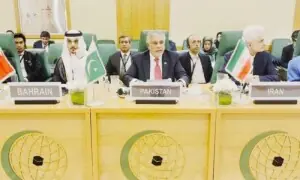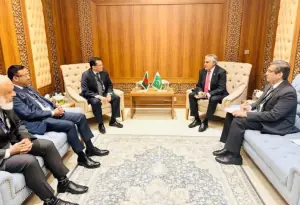Saudi Arabia amends import rules from Gulf in challenge to UAE
3 min readBy Aziz El Yaakoubi, Marwa Rashad and Davide Barbuscia
Saudi Arabia has amended its rules on imports from other Gulf Cooperation Council countries to exclude goods made in free zones or using Israeli input from preferential tariff concessions, in a challenge to the United Arab Emirates as the region's trade and business hub.
Despite being close allies, Saudi Arabia and the neighbouring UAE are competing to attract investors and businesses. Their national interests have also increasingly diverged, such as in their relations with Israel and Turkey.
Furthermore, Saudi Arabia - the biggest importer in the region - is trying to diversify its economy and reduce its dependence on oil, while providing more jobs for its own citizens, a point also covered by the rule changes announced at the weekend.
Saudi Arabia will henceforth exclude from the GCC tariff agreement goods made by companies with a workforce made up of less than 25% of local people and industrial products with less than 40% of added value after their transformation process.
The ministerial decree published on the Saudi official gazette Umm al-Qura said all goods made in free zones in the region will not be considered locally made.
Free zones, a major driver of the UAE's economy, are areas in which foreign companies can operate under light regulation, and where foreign investors are allowed to take 100% ownership in companies.
According to the decree, goods that contain a component made or produced in Israel or manufactured by companies owned fully or partially by Israeli investors or by companies listed in the Arab boycott agreement regarding Israel, will be disqualified.
The UAE and Israel signed a tax treaty last May as both sides work to spur on business development after normalising relations last year. Bahrain, another GCC member, has also normalised ties with Israel.
"The idea once was to create a GCC market, but now there’s the realisation that the priorities of Saudi Arabia and the UAE are very different," said Amir Khan, senior economist at Saudi National Bank.
"This regulation is putting flesh on the bone of these political divergences," he said.
In February, the Saudi government said it will stop giving state contracts to businesses that base their Middle East hubs in any other country in the region. That was another blow to Dubai, one of the UAE's emirates, which has built its economy on its open-for-business credentials and the promise of a glitzy lifestyle for well-heeled expatriates.
Saudi Arabia has announced the latest rule changes despite the fact that UAE is its second-biggest trade partner after China in terms of import value, based on recent Saudi trade data.
It is also a major re-exporting hub for foreign products to Saudi Arabia, including Turkish goods - which have been under an unofficial boycott by Riyadh.
The ministerial decree said companies with a local workforce of between 10% and 25% of the total could compensate the difference by increasing the industrial added value in their products and vice versa. The added value should not be less than 15% in any case to benefit from the preferential tariff agreement, it added.
Saudi Arabia and the UAE have also faced off in the last few days about an OPEC+ deal. The UAE opposed an agreement voted on Friday to raise output by some 2 million barrels per day from August to December 2021 and to extend remaining cuts to the end of 2022.
For the latest news, follow us on Twitter @Aaj_Urdu. We are also on Facebook, Instagram and YouTube.





















Comments are closed on this story.